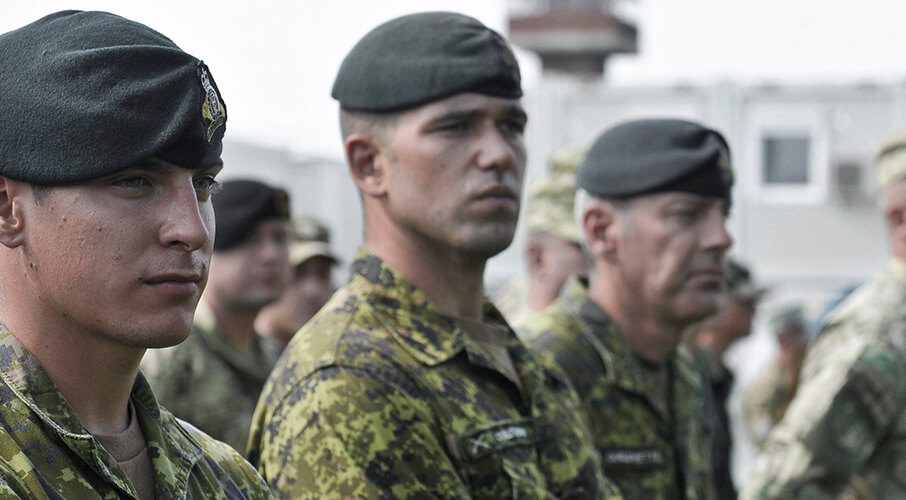 Noted Canadian academic Denis Stairs once characterized Canadian foreign policy as “speak loudly and carry a bent twig” — and his statement rings even truer today, writes Richard Shimooka in the Vancouver Sun.
Noted Canadian academic Denis Stairs once characterized Canadian foreign policy as “speak loudly and carry a bent twig” — and his statement rings even truer today, writes Richard Shimooka in the Vancouver Sun.
By Richard Shimooka, January 31, 2022
Over the last few years, and particularly in the last few months, Canadians have witnessed a return to a more violent era of international relations many once thought was in the past. While Russia and China have increasingly turned to coercion to achieve their foreign policy objectives, the recent buildup of military forces around Ukraine and the bellicose language employed by the Kremlin are on a scale not seen in recent times. Canadians should take note of the implications for our own security and well-being.
Sadly, the debate in Canada over the past decade has largely ignored these trends. To say that this country is unprepared, both intellectually and in hard capability, would be a gross understatement. Only now, when the country actually needs these tools, Canadians are becoming aware of the parlous state of our diplomatic and military spending. The Canadian military is threadbare and saddled with obsolete equipment, making it unable to provide any meaningful response to the crisis. It is a shameful situation for the world’s 10th largest economy, which once possessed one of the most advanced militaries in the Western world.
Canadians have been lulled into this situation. They have been fed a steady diet of comforting but meaningless statements by leaders of various political parties that exaggerate the country’s role in the international sphere.
On Tuesday, in a Ukrainian Canadian Congress town hall event, Foreign Minister Melanie Joly said that Canada was leading the response and was the Ukrainian specialist among the Western allies. This is a laughable proposition. Canada has not been party to any major diplomatic effort, such as the Geneva or Paris peace negotiations, nor is our contribution particularly noteworthy. This was further illustrated by the prime minister’s announcement that Canada will send an additional 60 military trainers and provide $340 million in non-lethal aid. It creates the perception that the government is doing something, when it would be charitable to describe the effort as meagre.
Joly’s exaggerated statements are not out-of-line with what other Canadian leaders have said in recent years. It’s an effective tactic to distract Canadians from the trend to spend less on foreign policy instruments.
Five years ago, the current government released a defence policy statement in which it promised to “build an even stronger Canadian Armed Forces, investing and operating sustainably over the next two decades.” Yet the opposite has happened, and Canada’s capability is at its lowest point since before the Second World War. Noted Canadian academic Denis Stairs once characterized Canadian foreign policy as “speak loudly and carry a bent twig” — and his statement rings even truer today. Our allies and adversaries have taken note of Ottawa’s wanting commitment to international security and acted accordingly.
Of course, it’s highly unlikely that Canada would send troops into Ukraine to fight Russian aggression. No NATO member is seriously considering such a course of action. But Ottawa does have a responsibility to defend our NATO treaty allies in Eastern Europe. Many of them are concerned about Russian aggression and expect us to provide support.
More broadly, a country’s military and diplomatic instruments are critical to ensuring its security and property. However, Ottawa’s neglect of this area has only pushed allies to ignore Canada’s interests altogether. Indeed, Canada’s absence from recent discussions around Ukraine are not an isolated incident. In the Indo-Pacific, for example, we were not asked to join the recent AUKUS agreement between Australia, the U.S. and the U.K. And the members of the Quadrilateral Security Dialogue — consisting of Japan, Australia, India and the U.S. — have shown little interest in engaging Canada in its military exercises or deliberations.
Within these forums, Canada’s allies are making decisions that affect our security and economic well-being — and Canada does not even have a seat at the table.
Unfortunately, there’s no short-term fix for this problem. Canada’s ability to do anything meaningful in the Ukrainian crisis is negligible. Unless corrective action is taken soon, Canada’s ability to respond to future crises or shape its broader security and prosperity will remain severely compromised for the foreseeable future.
Richard Shimooka is a senior fellow at the Macdonald-Laurier Institute.




